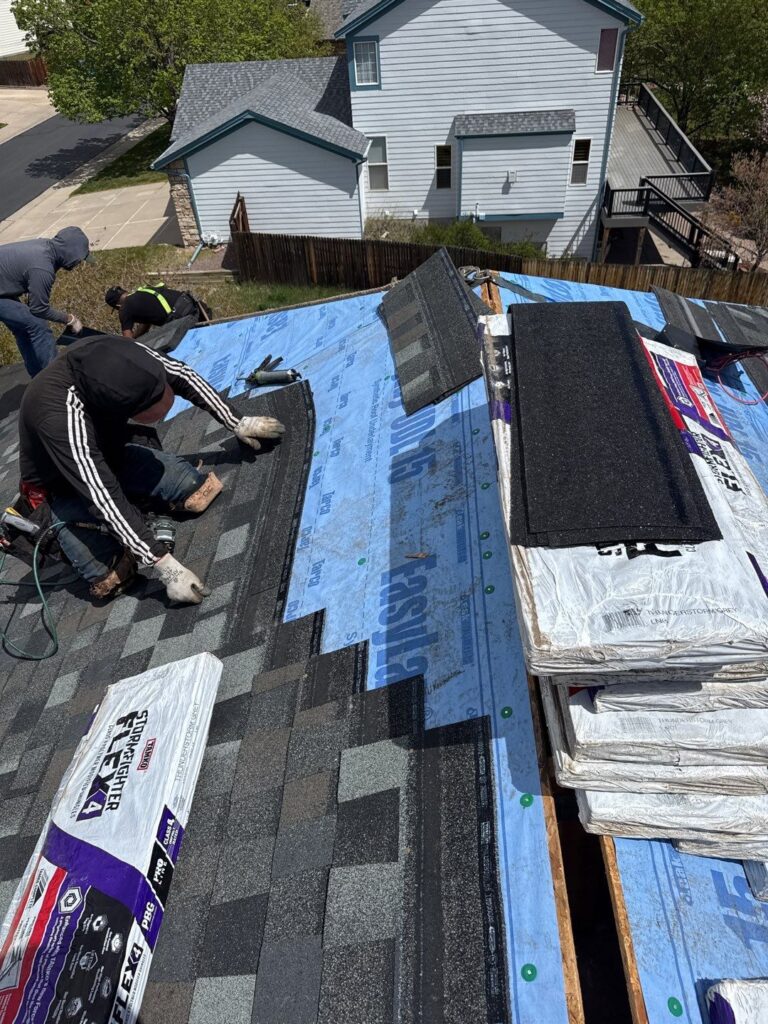
Hail storms are a frequent concern in Colorado, and when severe weather strikes, homeowners often wonder how much roof damage is required for an insurance company to cover a full replacement. Insurance policies vary widely, but understanding the basics can help you prepare for a smooth claims process and protect your home from long-term structural issues.
How Insurance Companies Assess Hail Damage
Most insurance providers evaluate hail damage by counting the number of impacts per roofing square (a 10-by-10-foot section of the roof). A common benchmark is around 8–10 visible hail hits within a square, but this standard is not universal. Some companies rely on different criteria, and coverage may depend on the severity of the strikes, the materials used, and the roof’s age.
Since every insurance carrier has unique rules, reviewing your policy carefully and discussing coverage with your provider is essential. A professional roof inspection will also strengthen your claim by documenting damage accurately.
Situations Where Coverage May Be Limited
Not every claim results in full coverage for a roof replacement. Insurance providers often deny or reduce payouts in certain cases, such as:
- Excessive Roof Age – If your roof has already exceeded its expected lifespan, coverage may be denied or only partially approved.
- Neglect or Pre-existing Issues – Ignoring prior damage, leaks, or failing to maintain your roof could reduce eligibility.
- Excluded Perils – Some policies limit or exclude hail coverage entirely, though this is less common in Colorado due to the frequency of hail events.
Replacement Cost vs. Actual Cash Value Policies
Insurance payouts typically depend on whether your plan is based on Replacement Cost or Actual Cash Value (ACV):
- Replacement Cost – Covers the full price of installing a new roof, without factoring in depreciation.
- Actual Cash Value (ACV) – Deducts depreciation, meaning older roofs will receive lower payouts.
Knowing which type of policy you have can dramatically impact the amount you receive after a hail claim.
Why a Professional Roof Inspection is Critical
Insurance companies require clear evidence before approving a roof replacement. A detailed inspection from qualified roofers in Denver ensures damage is properly documented, making the claims process smoother and more favorable. Beyond insurance approval, an inspection also identifies hidden structural problems that may worsen over time if left unrepaired.
What to Do After a Hail Storm
- Inspect the Property Safely – Look for dents in gutters, siding, or shingles, but avoid climbing onto the roof yourself.
- Schedule a Professional Inspection – Contact a licensed Denver roofing company to assess the extent of damage.
- File a Claim Quickly – Most policies require timely reporting of storm damage.
- Protect Your Home – Temporary repairs, such as tarping, may be necessary to prevent further leaks while waiting for insurance approval.
Trusted Local Roofing Help in Denver, Colorado
Homeowners in hail-prone areas need reliable professionals who understand both the roofing industry and insurance processes. Tried and True Roofing, based in Denver, Colorado, provides expert roof inspections, storm damage assessments, and high-quality replacement services tailored to local weather conditions. Partnering with a trusted contractor ensures your home is restored with durable materials while maximizing your insurance benefits.
Conclusion
Insurance coverage for hail damage depends on policy type, damage severity, and roof condition. While there is no exact number of hail strikes that guarantees a replacement, thorough inspections and clear documentation are crucial. By working with experienced Denver roofers, you can safeguard your home, secure fair insurance compensation, and ensure your roof is ready to withstand the next storm.

